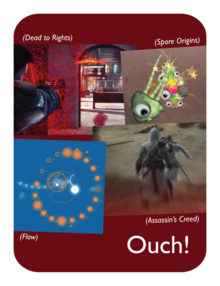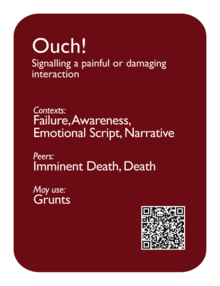Difference between revisions of "Ouch!"
ValterAlves (Talk | contribs) m |
ValterAlves (Talk | contribs) m |
||
| Line 9: | Line 9: | ||
| screenshots= | | screenshots= | ||
| rel-tag1=Contexts:<br> | | rel-tag1=Contexts:<br> | ||
| − | | rel1=[[Failure]], [[Awareness]], [[Emotional Script]] | + | | rel1=[[Failure]], [[Awareness]], [[Emotional Script]], [[Narrative]]<br> |
| rel-tag2=Peers:<br> | | rel-tag2=Peers:<br> | ||
| rel2=[[Imminent Death]], [[Death]]<br> | | rel2=[[Imminent Death]], [[Death]]<br> | ||
| Line 17: | Line 17: | ||
| description= | | description= | ||
Considering that the mechanics of many games demand managing the health of the characters, an effective way to signal interactions that result in damage to their status is to allow themselves to express such events, diegetically.<br /> | Considering that the mechanics of many games demand managing the health of the characters, an effective way to signal interactions that result in damage to their status is to allow themselves to express such events, diegetically.<br /> | ||
| − | Sounds associated to [[Ouch!]] have an utilitarian role in making the player aware for the consequences of a particular option or circumstance. Yet, their role goes beyond the mere [[Awareness]], potentiating more meaningful interpretations and contributions to the [[Emotional Script]]. | + | Sounds associated to [[Ouch!]] have an utilitarian role in making the player aware for the negative consequences of a particular option or circumstance. Yet, their role goes beyond the mere [[Awareness]] for a [[Failure]] condition, potentiating more meaningful interpretations and contributions to the [[Emotional Script]]. |
| − | + | In some ways, [[Ouch!]] announces that repeating or not ceasing to meet the damaging condition will eventually lead to [[Death]]. | |
| + | |||
| + | [[Ouch!]] is frequently expressed through [[Grunts]], although that depends on the characteristics of the [[Character Soundprint|Character's Soundprint]]. | ||
| − | |||
| examples= | | examples= | ||
| ex1=<mt p="Ouch" g="Assassins Creed" altg="Assassin's Creed" w="{{R16by9W}}" h="{{R16by9H}}"></mt> | | ex1=<mt p="Ouch" g="Assassins Creed" altg="Assassin's Creed" w="{{R16by9W}}" h="{{R16by9H}}"></mt> | ||
Revision as of 08:14, 13 October 2011

|

| |
| The card's front face | The card's back face |
Contents
Synopsis
| Signalling a painful or damaging interaction. |
Relationships
Contexts:
Failure ![]() , Awareness
, Awareness ![]() , Emotional Script
, Emotional Script ![]() , Narrative
, Narrative ![]() .
.
Peers:
Imminent Death ![]() , Death
, Death ![]() .
.
May use:
Grunts ![]() .
.
Description
Considering that the mechanics of many games demand managing the health of the characters, an effective way to signal interactions that result in damage to their status is to allow themselves to express such events, diegetically.
Sounds associated to Ouch! have an utilitarian role in making the player aware for the negative consequences of a particular option or circumstance. Yet, their role goes beyond the mere Awareness for a Failure condition, potentiating more meaningful interpretations and contributions to the Emotional Script.
In some ways, Ouch! announces that repeating or not ceasing to meet the damaging condition will eventually lead to Death.
Ouch! is frequently expressed through Grunts, although that depends on the characteristics of the Character's Soundprint.
Examples
  FlOw: A less evident representation of "pain", which is coherent with the Character's Soundprint and with the game's Acoustic Ecology.
|





